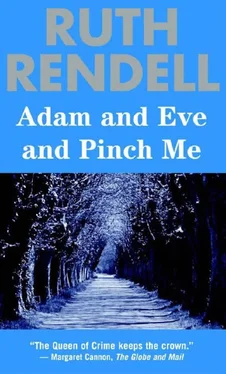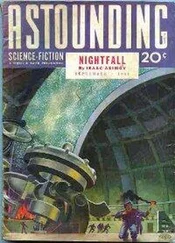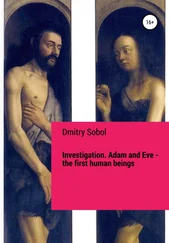Jims hadn’t much in the way of morals; he was generally unprincipled and unscrupulous and quite capable of telling a “white lie” to the police. But when he thought of asking his wife to lie for him, to tell a detective inspector of the murder squad (or whatever they’d changed its name to) that he had been here when he hadn’t, his blood ran cold. He was a member of Parliament. Last week the leader of the Opposition had smiled on him, patted his shoulder, and said, “Well done!” Other MPs referred to him in the Chamber as the honorable member for South Wessex. The honorable member. “Honor” wasn’t a word Jims often much considered but he considered it now. In his position and capacity, honor was supposed to be attached to him; it was as much invested in him as in any medieval knight or servant of the sovereign. Sitting up in bed, wiping the perspiration off himself with a corner of the sheet, Jims told himself he couldn’t ask someone else to lie for him.
What he’d do was forget all about having come home for those notes. Between now and nine when the police were arriving, it would slip his mind. After all, he hadn’t really needed them and could easily have delivered a successful speech without them. It was only that he disliked going unprepared to any function at which he had to speak. He made an effort to get back to sleep but he might as well have tried to turn time back a couple of days, which he would also have liked to do. At six he got up and found that Eugenie and Jordan had already destroyed the peace of his living room by switching on the television to a noisy and very old black-and-white Western. By the time the police came he was cross and moody, but he contrived to sit on the sofa beside Zillah, holding her hand.
The detective inspector was the same woman who had gone with Zillah to the mortuary. She had another plainclothes officer with her, a sergeant. Zillah asked her if she minded Jims’s wife being present and she said not at all, please stay. Zillah squeezed Jims’s hand and looked lovingly into his face, and Jims had to admit to himself that sometimes she could be an asset to him.
He was asked about the weekend and he said he’d spent it in Dorset. “I went down to my constituency on Thursday afternoon and held my appointments in Casterbridge on Friday morning. At the Shire Hall. After that I drove back to my house in Fredington Crucis and worked on a speech I was making on Saturday evening to the Countryside Alliance. I spent the night there and the following day, made my speech later on, and dined with the alliance. I drove home here on Sunday morning.”
The sergeant took notes. “Is there anyone who can confirm your presence in your Dorset house on Friday, Mr. Melcombe-Smith?”
Jims put on an expression of incredulity. It was one he’d often worn in the House of Commons when some government member made a remark he thought it would become him to regard as ludicrous. “To what are these questions tending?”
He knew the answer he’d get. “They are a matter of routine, sir, that’s all. Is there someone who can confirm your presence? Perhaps a member of your staff?”
“In these degenerate days,” drawled Jims, “I do not have a staff. A woman comes up from the village to clean and keep an eye on things. A Mrs. Vincey. She provides food in the fridge for the weekend when I’m going to be there. She wasn’t there that day.”
“No one called on you?”
“I fear not. My mother spends part of the summer there but mostly she lives in Monte Carlo. She was here, of course, for our wedding”-Zillah’s hand received a squeeze-“but she went back a month ago.”
The police officers looked rather puzzled by this unnecessary information, as well they might. “Mr. Melcombe-Smith, I’m not questioning what you say, but isn’t it rather odd for a young and active man like yourself, a very busy man and newly married, to pass what must have been about thirty hours indoors with nothing much to occupy him but the sort of speech he was well used to making? It was an exceptionally fine day and I believe the countryside around Fredington Crucis is beautiful, yet you didn’t even go out for a walk?”
“You certainly are questioning what I say. Of course I went for a walk.”
“Then perhaps someone saw you?”
“I am unlikely to know the answer to that.”
Later in the day Jims was walking across New Palace Yard toward the members’ entrance. He felt reasonably satisfied with what had happened and was sure he’d hear no more. After all, they couldn’t possibly suspect him of making away with Jeffrey Leach, not him . He had no motive, he hadn’t seen the man for at least three years. In the worst-case scenario, if they found out about his return to London-and they couldn’t-he’d brazen it out, say he’d forgotten. Or give story number four, the one he hadn’t thought of in the small hours, that he’d returned in the night after Zillah was asleep, slept in the spare room so as not to disturb her, and left before she was awake. That would cover everything.
When Michelle told her the murdered man in the cinema was Jeff, Fiona had suffered that momentary loss of consciousness once apparently common in women but now rare. She fainted. Michelle, who a few weeks ago couldn’t have got down to the floor, did so with ease, sat beside her stroking her forehead and whispering, “My dear, my poor dear.”
Fiona came to, said it wasn’t true, was it? It couldn’t be true. Jeff couldn’t be dead. She’d seen a paper which said it was someone called Jeffrey Leach. Michelle told her the police were coming. Would she feel able to see them? Fiona nodded. The shock had been so great, she couldn’t take much else in. Michelle got her onto the sofa, helped her put her feet up, and made milky coffee with plenty of sugar in it. A better remedy for shock than brandy, she said.
“Was he really called Leach?” Fiona asked after a moment or two.
“It seems so.”
“Why did he tell me he was called Leigh? Why did he give me a false name? He’d been living with me for six months.”
“I don’t know, darling. I wish I knew.”
At her interview with the police-the same woman who had taken Zillah to the mortuary and would speak to Jims the next morning-Fiona suffered the beginnings of disillusionment to add to the pain of her loss. That his name was truly Jeffrey John Leach was confirmed, that he was in touch with his former wife, and that he appeared to have had no employment for several years, not perhaps since his student days. The police asked her where she’d been on Friday afternoon and to that she gave very little thought. She could easily name half a dozen people who saw and spoke to her at her merchant bank between three and five. “I wouldn’t have harmed him,” she said, a tear running down her face. “I loved him.”
They examined Jeff’s clothes and what they called his “personal effects.” As a result of watching television programs, Fiona asked tentatively if she would be needed to identify Jeff. They said that wouldn’t be necessary, as Mr. Leach’s former wife had already done so. Fiona found this more upsetting than anything she’d so far heard and she began to sob. Through her tears she made it known that she’d like to see Jeff and they said that could be arranged.
When they’d gone she fell into Michelle’s arms. “There’s never been anyone I felt about the way I did about him. He was the man I’d been waiting for all my life. I can’t live without him.”
Most people would say eight months’ acquaintanceship wasn’t enough for life, and Fiona’s sorrow would pass, but Michelle had known Matthew for only two when she married him and what would she have felt if he’d died? “I know, darling, I know.”
Читать дальше











